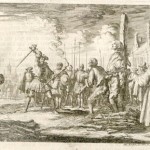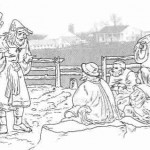Replay: Jesus demonstrates God’s love even towards those who reject him
Five years ago, I wrote a post called “Jesus demonstrates God’s love even towards those who reject him.” It was actually part of a short series that I did based on a meme that was going around the blogs about then. (Do you remember what blog memes were/are?) There are several passages in the Gospels that proclaim Jesus’ love either in word or deed. But, one passage in Mark in particular has always awed me. Mark writes about how Jesus loved someone who rejected him.
——————————
Jesus demonstrates God’s love even towards those who reject him
I was tagged by Bryan at “Charis Shalom” to post five things I dig about Jesus. It was very interesting thinking about five things, so I’m blogging through my list. The third “diggable” item on my list was that Jesus demonstrates God’s love even towards those who reject him.
Jesus is the supreme demonstration of God’s love toward us – not a mental, philosophical, idealistic kind of love, but an active, moving, giving, doing kind of love. Jesus’ love cannot be earned, cannot be repaid, cannot be lost, cannot be duplicated.
According to Jesus, the entire Hebrew Bible can be wrapped up in one two-fold command: Love God and love your neighbors. (Matt 22:38-39; Mark 12:30-31) According to Luke, a Jewish expert in the law agreed with Jesus. (Luke 10:25-28) James combined the two-fold command into one: If you really fulfill the royal law according to the Scripture, “You shall love your neighbor as yourself,” you are doing well. (James 2:8)
Love is important… love is necessary… love is central. And, God demonstrated his love for us in Christ’s death on our behalf. Notice, Christ did not die for us because we were righteous; he died for us while we were sinners. He did not die for us because of our worth; we were worthless without him. He did not die for us because we deserved it; we deserved only death, condemnation, and damnation. Christ died for us because he loved us.
There remains nothing in us to earn God’s love; and yet he loves us. In fact, though we cannot earn his love, we also cannot be separated from his love. God’s love for us through Christ is complete and eternal. This love is granted to us by grace; lavished on us despite ourselves.
But, what about those who reject Jesus? Sure, God loves those of us who are in Christ. He loves those who are new creations. He loves the sheep; but what about the goats?
There was once a rich, young man who came to Jesus. He asked Jesus a very important question: “Why must I do to have eternal life?” After a short conversation, Jesus told the man to sell everything he had and follow Jesus. The man refused because he had great riches. (Matt 19:16-22; Mark 10:17-22) The man rejected Jesus in favor of the riches of this world.
Mark, as he often does, adds a piece of information that is not found in the other accounts. Mark said that Jesus loved the young man. (Mark 10:21) Jesus loved the man who rejected him. God-in-flesh, worth of glory and worship, loves someone who rejects him for land and money. This is the same God-Man who would look at those who were crucifying him and ask his father to forgive them.
I have chosen to follow Jesus. And, sometimes, I do. Hopefully, I follow him most of the time. But, honestly, like Peter, I often follow other voices that are not the voice of my father in heaven. During those times, I reject Jesus. And, Jesus loves me.
Sometimes, by my words and actions and attitudes, I deny and even attempt to separate myself from Jesus – again, much like Peter. And, Jesus loves me.
God demonstrates his love toward us in that while we were yet sinners, Christ died for us. And he loves us, and loves us, and loves us, and loves us…
We can’t measure the fullness of Christ’s love for us – we will never reach the end, never find the boundary, never cross the line, never go too far, never find that last straw. (Eph 3:18-19) Nothing will separate us from Christ’s love – not Satan, not demons, not sin, not ourselves. (Rom 8:35-39)
When others forsake us, God loves us. When others disparage us, God loves us. When others hate us, God loves us. When others shame us, God loves us. When others forsake us, God loves us. When others are more holy, righteous, mature, godly, spiritual, efficient, practical, committed, involved, knowledgeable, smiling, Christian… God loves us – with an active, moving, giving, doing kind of love.
Whenever… Whatever… Wherever… God loves you!
That God kind of love
If faith (trust) is one of the most pervasive terms in Scripture (as I said in my previous post “Show me your faith apart from your works“), another term which is often found alongside it is love. In fact, the ideas of faith and love are often intertwined and interrelated by the authors of Scripture. (Just browse through 1 John to see this connection.)
In Scripture, love is the primary response of God towards people, and love is supposed to be the primary response of people toward God and toward other people. If this is not clear in the majority of Scripture, Jesus certainly spells it out for his listeners in this passage in the Gospel of Matthew:
And one of them, a lawyer, asked him [Jesus] a question to test him. “Teacher, which is the great commandment in the Law?” And he [Jesus] said to him, “You shall love the Lord your God with all your heart and with all your soul and with all your mind. This is the great and first commandment. And a second is like it: You shall love your neighbor as yourself. On these two commandments depend all the Law and the Prophets.” (Matthew 22:35-40 re-mix)
Jesus’ audience immediately understood the implication of his instructions to love your neighbor as yourself. So, in response, someone asked him to clarify what he meant by “neighbor.” Luke tells us that it was at this point that Jesus told the parable that we call “the Good Samaritan.” While the Samaritan’s love is impressive, we often lose sight of the extent and scope of that love because of cultural and historical differences.
Jews and Samaritans hated one another. When traveling, they would each go out of their way to avoid running into each other. While there were many historical and cultural reasons for this animosity, religious differences lie at the root of the bitter feelings that the Jews and Samaritans had for one another. The hatred was ingrained; it was taught and learned from birth. Thus, the Samaritan’s love is even more shocking given this background. Furthermore, the Samaritan’s love was not simply an emotional response, but instead it resulted in action that benefited the other individual. Jesus is saying that this is the kind of love that we should have for anyone that we meet: a love that goes beyond differences and cultural standards and generously gives and serves for the benefit of the other, that is, for the one who should be hated.
Previously in Matthew, Jesus had said,
For if you love those who love you, what reward to you have? Do not even the tax collectors do the same? And if you greet [accept] only your brothers [and sisters], what more are you doing than others? Do not even the Gentiles do the same? (Matthew 5:46-47 ESV)
As Jesus points out, even those who are not part of God’s kingdom “love” people who are lovable and who love them back. This is normal love… natural love… worldly love. It is the kind of love that asks the question, “What can I get out of this?” It is the kind of love that is extended because of who the other person is or what the other person does.
This is not God’s kind of love. It is not the kind of love that he demonstrated toward us, and it is not the kind of love that we are supposed to demonstrate towards others. But, this God-kind of love is extremely important for those of us who follow Jesus Christ. Notice that in this passage Jesus said that the teachings of the Old Testament (the Law and the Prophets) depends upon this two-fold kind of love: love of God and love of neighbor. Just love of God or just love of other people is not enough. It is the combination of the love of God and love of others that demonstrates God’s kind of love.
But, Jesus said this God-kind of love demonstrates more than the teachings of the Law and the Prophets (the Old Testament). Jesus also said that those who love in this way show the world that they are truly his disciples.
Replay: Learning to live dependent on God and interdependent on one another
Four years ago, I wrote a post called “Interdependence.” The post was written after a weekend in which I witnessed a man who refused to admit that he needed help and refused to accept help when it was offered (although it was clear that he did need help). That same weekend, I witnessed a friend admit that she needed help and other friends offer help. It reminded me that we are both dependent on God, and interdependent upon one another – as God often works through his children to help one another.
I hope this post is as encouraging to you as the actual experiences were to me.
———————————–
Interdependence
As followers of Jesus Christ, we are both dependent upon God, and interdependent upon one another. Unfortunately, society teaches us to be independent – neither dependent nor interdependent. We’re taught to learn for ourselves, fend for ourselves, care for ourselves, earn for ourselves, and do for ourselves. We’re taught not to admit that we need help from anyone nor to accept help from anyone. This is the nature of American society, but it is not the nature of the follower of Jesus Christ – he or she has a new nature.
This point was driven home for me last Friday. Our family arrived at the event location for the North Raleigh / Wake Forest Relay for Life around 5:15 p.m. We were supposed to drop off our canopy, chairs, tables, etc. – which we did. The committee was supposed to pick up our stuff and take it to our site – which they did. I was supposed to park my vehicle – which I did – while my family walked to our site – which they did. Everything was going according to plan.
Except… as soon as I parked our van, it started to rain. It wasn’t a slow sprinkle, it was a gully-washer – at least, that’s what we called it in Alabama. The entire time that I was walking – running – to our event site, I could picture my family standing in the middle of a muddy field getting drenched by the rain. Imagine my surprise when I reached our site to find that two teenagers from a nearby site had come to their rescue! The two young men were helping my wife set up the canopy, and they had pulled all of our equipment under the canopy. Those two teenagers were my heroes that night! After I arrived, I helped them finish setting up the canopy, and we stayed as dry as we could while the rain continued.
Not long after our canopy was set up, another team arrived at the site next to ours. The team – at this time – consisted of a mother, her teenage daughter, and two or three more teenage girls. My family helped them spread their canopy over their stuff. We offered to help them raise their canopy, but they said they didn’t want to raise it yet. Instead, they stood under some umbrellas and waited for the husband to arrive.
When the husband arrived, I again went over and offered assistance. I told him that some boys from a neighboring site had helped us, and that we would love to help them set up their canopies – they actually had two. He said no. He didn’t need the help, but thank you anyway.
We watched and listened as he struggled to raise the canopy in the wind and rain. He was obviously getting frustrated because his family was not doing things the way he thought they should be done. They often spoke loudly – shouted – at one another as they tried to raise the two canopies and keep their stuff dry at the same time.
When the shouting had subsided for a moment, and when tempers seems to settle a little, I again walked over and asked if I could help. He said… and I quote… “No, we like to fight while we do this.” I told him that I would be glad to help, if he decided he needed anything. Then, I walked back to my canopy.
As I think back over this encounter, I recognize the church acting in this stubborn, independent manner many times. It seems that even believers have the attitude that they can do everything by themselves and they don’t need any one’s help. It often appears that many feel that asking for help or accepting help from others is a sign of weakness or spiritual immaturity.
This is such a travesty and a misunderstanding of what it means to be brothers and sisters in Christ. God provides us with relationships with one another so that we can love one another, accept one another, help one another, give to one another, and serve one another. We cannot make it through this life alone – at least, we cannot live the way God wants us to live alone. We need God, and we also need one another. Independence may be an American virtue, but it is a Christian vice.
The next day, Saturday, my family was helping one our young, single, female friends move. (I mentioned this briefly in my post called “Weekend of Service“.) A few weeks before, this young lady began telling people that she needed help finding a place to live. Another family asked if she would like to live with them. They shuffled their boys’ bedrooms so that our friend could have a room to herself, and Saturday afternoon, a bunch of us got together, packed up her belongings, and moved her into their house.
After unloading all of the boxes, another friend brought dinner for everyone. While I was sitting there enjoying a homemade meatball sub, I remembered the encounter with the man who refused to acknowledge that he needed help, and refused to accept help when it was offered. What a stark contrast to my friends, one of whom acknowledged that she needed help and accepted the help that was offered, and a family who was willing to put their own comforts aside and offer help.
This is a beautiful picture of God’s family. Brothers and sisters recognizing their complete dependence upon God and willing to live interdependent upon one another. That evening, I couldn’t help but thank them and praise God for the example of community that he had shown me that day.
Love your enemies… an ideal or a way of life?
Thanks to Robert from “Abnormal Anabaptist” for pointing out the story of Dirk Willems in his post “This Day In History: Love Your Enemy.”
Robert’s post points us to an article called “Compassion for the Enemy.” It includes a small part of the story of Dirk Willems who was burned to death in 1569.
Willems escaped from a palace where he had been imprisoned. The quote below tells what happened after a guard spotted him:
Seeing him escape, a palace guard pursued him as he fled. Dirk crossed the thin ice of a pond, the “Hondegat,” safely. His own weight had been reduced by short prison rations, but the heavier pursuer broke through.
Hearing the guard’s cries for help, Dirk turned back and rescued him. The less-than-grateful guard then seized Dirk and led him back to captivity. This time the authorities threw him into a more secure prison, a small, heavily barred room at the top of a very tall church tower, above the bell, where he was probably locked into the wooden leg stocks that remain in place today. Soon he was led out to be burned to death.
Yes, for Willems, “Love your enemy” was more than an ideal; it was a way of life in Jesus Christ.
Thanks, Robert!
Unconditional love… with a few conditions
Swanny at “Allergic to BS” has written a very good post called “‘Us’conditional Love.”
The point of the post is the we often only love those who are like us in various ways. This “us”conditional love could be offered only toward those who agree with theological system or who are part of our “local church” organization.
While Swanny focuses on those who are part of “institutional churches,” I’ve seen “us”conditional love from those who are more “organic” as well.
Here’s a great quote from Swanny:
A consequence of this categorical “us” system is extreme prejudice. No, you do not get zapped with this internal disease quickly. It actually happens rather slowly over time like a deadly poison drip. It infects the inner-prejudice in all of us until we are absolutely paranoid of becoming like one of “them” outside the walls. We begin to have great contempt for those who fall into the sub-category of sinner. What is implied is “yeah, we are sinner’s too, but not like that sinner over there”, and soon people start to despise anyone who just falls.
Whether we are part of a “local church” organization or not, it is helpful for each of us to consider our reaction to those who are not like us, who do not agree with us, or who may even disparage us. Do we find they fall under the umbrella of love or are we making excuses for not loving them? Are we adding other conditions to “love”?
John’s warning is pretty clear:
If anyone says, “I love God,” and hates his brother, he is a liar; for he who does not love his brother whom he has seen cannot love God whom he has not seen. (1 John 4:20 ESV)
If we find that we are adding conditions to love – conditions that others much meet before we love them – then the problem is not with “them.” The problem is that we do not love God.
Replay: When we had nothing to offer them but ourselves
Three and a half years ago, I wrote a post called “No produce, just relationships.” Often, when we find someone in need, God will lead us to provide for those physical needs. However, as much as the people may need that physical help, they need something else even more. God works through relationships, and when we pour our lives into other people, we are bringing Jesus Christ with us. Here is a real story that God used to teach me this lesson.
——————————
No produce, just relationships
At the beginning of the summer, our family and some friends began to visit a local government assisted housing development. Cathy, a friend of ours who is part of the church with us, introduced us to many of her neighbors, and we met other neighbors while spending time in the neighborhood.
When we started visiting the people in this neighborhood, we would take them small bags of fresh produce or fresh baked bread. Why? For several reasons. 1) The produce and bread were small tokens to demonstrate our concern for them. 2) Often charitable groups bring in old produce, breads, cookies, and cakes that other people would not buy. We wanted to give them something that anyone would want… not leftovers. 3) We wanted to give vegetables, fruit, and wheat bread to encourage a healthy lifestyle. 4) We were hoping the produce and bread would give us opportunities to serve them in other ways, including opportunities to proclaim the gospel.
A few weeks ago, the lady that runs the produce stand (Vivian – which is another story altogether) told us that the stand was closing. That morning, as we told the people in the neighborhood that the produce stand was closing, they all said about the same thing: “You’re still going to visit us, aren’t you?” Our weekly visits had turned into more than an opportunity to hand out produce. We had begun to build relationships with the neighbors.
So, throughout the week, I often find myself thinking about and praying for Cathy, Dennis, Tina, Mrs. Jeans, Shonna and her children (Marvin, Laruen, and Mya), Mrs. Woodlief and her son Benny, and Mrs. Fort. We’ve met a few other people in the neighborhood, but these are the ones with whom we usually spend the most time. These are the people who have opened their homes and their lives and have invited us in.
If you think about, please pray for Dennis. His father passed away last Friday, and the funeral is Monday.
And, pray for Cathy. She’s struggling with health issues – emphysema and back pain.
Also, pray for Tina. Tina’s son died from an overdose a couple of weeks ago. Tina ended up being hospitalized herself because of emotional issues a few days later. Now, she is dealing with several other issues related to her ex-husband and former care giver.
Pray for Mrs. Jeans. She had skin cancer on her ear last summer. The doctor removed part of her ear, but now something else is wrong. She has also been struggling with health issues, including a couple of weeks with the flu. Plus, her nephew is having family issues also.
If you ask Mrs. Woodlief, she’ll tell you to pray for everything. But, we know that her foot often hurts her, and she has to walk with a cane then.
And, Mrs. Fort will always tell you to pray for her knee. When the weather changes – which has happened alot lately – her knee hurts as well. If you think about it, also pray for the grandchildren and great-grandchildren who live with Mrs. Fort.
We can no longer offer these precious people fresh vegetables and fruit. We still carry fresh bread occasionally. But, they’ve let us know that they don’t want the produce and bread as much as they need the relationships. For many of them, we’re their only support system. We don’t have much to offer financially, but we can and do offer the love of God as often as possible.
Do you think there may be someone out there waiting for you to demonstrate the love of God? Why not start getting involved in someone’s life today?
From the Anabaptists: Schlaffer on love and sacrifice
Last week, I enjoyed reading an article about Anabaptists and writing about that article in my post “Which Distinctive Practices and Beliefs of Anabaptists are Important for the Church Today?” Reading that article, writing the post, and following the discussion in the comments reminded me of a great book that I read online last year called “The Secret of the Strength.” One of the things that I love about that book is that the author (Peter Hoover) includes many, many quotations from the Anabaptists themselves.
For the next few days, I’m going to post a few of those quotations. You may not agree with everything they wrote, but hopefully they will help us thinking about our new life in Jesus Christ.
This quotation was written by Hans Schlaffer just before he was beheaded in 1528:
The body of Christ on the earth is the Gemeinschaft (community) of those who believe on him. Whoever eats the bread of the nighttime meal expresses with that his desire to live in Gemeinschaft with this body and to be a part of it in all things—to stick with the Gemeinschaft though joy and sorrow, riches and poverty, honour and shame, mourning and rejoicing, death and life. He expresses his desire to give everything he has, both body and life for his brothers even as Christ gave himself for us.
When I read this short quote, I can’t help but notice the connection: Christ to the body of Christ and the body of Christ to one another. It’s a seamless connection to Schlaffer. Even sharing the nighttime meal (“communion” for the Anabaptists) is much more than sharing food. It is a recognition of their relationship to one another through Christ.
And, because their relationship to one another was based on their relationship to Christ, they were committed to one another. I’m not talking about committed to meeting together once a week, or committed to some program or leadership structure. They gave their lives – physically and spiritually – for one another.
Consider Schlaffer’s description: “to stick with the community though joy and sorrow, riches and poverty, honour and shame, mourning and rejoicing, death and life.” Does it sound familiar? Does it sound like the promises that a husband makes to a wife?
You see, even today we recognize the spiritual commitment between a husband and a wife. But, do we recognize that Scripture describes the same kind of spiritual commitment between brothers and sisters in Christ?
We recognize the destruction that happens when a husband and wife relationship is severed. But, do we recognize that – in reality – similar damage happens when any relationship between brothers and sisters in Christ is severed.
When we recognize the importance of unity and fellowship among brothers and sisters in Christ, we will also begin to understand what it means to commit ourselves to one another in Jesus Christ.
Why was this type of commitment present among the Anabaptists? Because they were willing to sacrifice themselves for the sake of others. They cared more about others than they cared about themselves.
From the Anabaptists: Simons on love and community
Last week, I enjoyed reading an article about Anabaptists and writing about that article in my post “Which Distinctive Practices and Beliefs of Anabaptists are Important for the Church Today?” Reading that article, writing the post, and following the discussion in the comments reminded me of a great book that I read online last year called “The Secret of the Strength.” One of the things that I love about that book is that the author (Peter Hoover) includes many, many quotations from the Anabaptists themselves.
For the next few days, I’m going to post a few of those quotations. You may not agree with everything they wrote, but hopefully they will help us thinking about our new life in Jesus Christ.
This quotation was written by Menno Simons in 1551:
We teach that all Christians are one body (1 Cor. 12:13). All partake of one bread (1 Cor. 10:18). All have one God (Eph. 4:5- 6). It is only reasonable that Christians care one for another. The entire Scriptures speak of mercy and love, the sign by which true Christians are known. “By this shall all men know that you are my disciples, if you love one another” (John 13:15).
It is not normal for a person to care for one part of his body and leave the rest uncared for and naked. No. The intelligent person cares for all his members. It is this way in the Lord’s church as well. All who are born of God and called into one body are prepared to serve their neighbours, not only with money and goods, but like Christ did, with life and blood. They show mercy as much as they can. No one among them is allowed to beg. They take strangers into their homes. They comfort the afflicted, clothe the naked, feed the hungry, and do not turn their faces from the poor.
For the Anabaptists, everyone who was in Christ was also part of the kingdom of God and the community (Gemeinschaft) of believers, i.e. they were part of the church. And, the church cared for one another just as a human takes care of his entire body.
The important part of Simon’s quote is who he considered to be part of this “body” with him. Notice he begins with this: “all Christians are one body.” He does not distinguish. If he considers someone a Christian, then he also considers that person to be part of the church along with him. He is willing to lay down money, possessions, life, and blood for that person.
Not only is this service offered to all who are in Christ, it is also the work of all who are in Christ. He wrote, “All who are born of God and called into one body are prepared to serve their neighbours.” All. This is mutual service (ministry). Everyone is ready to serve whoever is in need of service. There is no sectarianism or divisions.
Today, if Christians care for and serve one another, they tend to do so within the boundaries of local church organizations. I do not think this is the kind of service that we see in the New Testament, and it’s not the kind of service that the Anabaptists displayed either.
From the Anabaptists: Spittelmayr on love and property
Last week, I enjoyed reading an article about Anabaptists and writing about that article in my post “Which Distinctive Practices and Beliefs of Anabaptists are Important for the Church Today?” Reading that article, writing the post, and following the discussion in the comments reminded me of a great book that I read online last year called “The Secret of the Strength.” One of the things that I love about that book is that the author (Peter Hoover) includes many, many quotations from the Anabaptists themselves.
For the next few days, I’m going to post a few of those quotations. You may not agree with everything they wrote, but hopefully they will help us thinking about our new life in Jesus Christ.
This quotation was written by Ambrutz (Ambrosius) Spittelmayr just before he was beheaded in 1527:
Nobody can inherit the kingdom unless he is poor with Christ, for a Christian has nothing of his own, no place where he can lay his head. A real Christian should not even have enough property on the face of the earth to stand on with one foot. This does not mean that he should lie down in the woods and not have a job, or that he should not have fields and pasture lands, or that he should not work. It simply means that he should not think that these things are for his own use and be tempted to say, “This house is mine. This field is mine. This dollar is mine.” Rather he should say, “It is ours,” even as we pray “Our Father.”
A Christian should not have anything of his own but should have all things in common with his brother, not letting him suffer need. In other words, I will not work that my house be filled, that my pantry be supplied with meat, but rather I will see that my brother has enough, for a Christian looks more to his neighbour than to himself.
This teaching directly contradicts the “American Way.” (I can’t speak as much about the culture of greed in other countries.) Saving, building, hoarding, storing… this is the way of life in America, but it was not the way of life among the Anabaptists or among the early believers as recorded by Luke in the Book of Acts.
So, which way of life are we going to follow? Are we willing to admit that we have been so influenced by the greed of the American dream that we have missed the call of the Spirit to give to others? Or, do we continue to make excuses, blaming others for their lack or need, finding reasons not to help those who need it?
When you hold a dollar in your hand (or a hundred dollars, or a thousand dollars, or a million dollars), do you assume that God gave it to you for your own benefit? Could it be that God gave that to you so that you could use it to benefit others? It would be just like him, wouldn’t it? He is, after all, the God who gave and gave and gave… even giving his own son.
Interestingly, I’ve spent a short time in two cultures (outside of the United States) that are known to be among the poorest in the world. And, I found the Christians in those two cultures to be more giving and sharing than many in the USA.
Do you find it easier to share when you have much or when you have little? Why do you think the voluntary sharing of property was so important to the early church or to the Anabaptists in the 16th century?
From the Anabaptists: Brandhuber on love and obedience
Last week, I enjoyed reading an article about Anabaptists and writing about that article in my post “Which Distinctive Practices and Beliefs of Anabaptists are Important for the Church Today?” Then, it seems that you (my readers) enjoyed the post and the distinctives as well – even in the points that you disagreed.
Reading that article, writing the posts, and following the discussion in the comments reminded me of a great book that I read online last year called “The Secret of the Strength.” One of the things that I love about that book is that the author (Peter Hoover) includes many, many quotations from the Anabaptists themselves.
For the next few days, I’m going to post a few of those quotations. You may not agree with everything they wrote, but hopefully they will help us thinking about our new life in Jesus Christ.
The first quotation was written by Wolfgang Brandhuber just before he was executed (Sendbrief an die Gemeinde Gottes, 1529):
If we want to be one with God, we need to be one with his will (Christ Jesus). That happens when we tell him about our great needs and when we tell him that we love him. If we love him we keep his commandments because love—if it is love—comes from the heart. How could true love be anything but from the heart? And love continually seeks love, like the bride in Solomon’s song who can sing and speak of nothing else.
True Christianity works on nothing but love. It needs no law because it fulfills the commands of God out of pure love and exercises itself in this day and night. It leaves everything earthly behind. It despises everything earthly to the pit, and asks: “Why bother with that?” It seeks because it loves. The more it loves the more it seeks to be loved—engaging itself to the Beloved One and peering out through the lattice work to watch him come from afar.
For so many, love does not seem to be enough. So, rules and procedures are put in place to make certain that everything happens as it should and everyone acts as they should. But, in reality, people cannot obey God apart from love. You would think that we would have learned from the examples we read about in the Old Testament that we cannot make ourselves obey God, even when we really want to.
Love is enough. In fact, love is all we have – love produced by the indwelling presence of the Holy Spirit as we submit to him. Through that love, we can now obey. And, if we are not obeying, the problem is not with our lack of action or even with wrong action. The problem is with love. We do not try harder or give God more or be excellent. We confess, submit, and trust in his love.
We can do many things without love. But, we cannot obey God without love. And, if we find that we are not obeying God – not following Jesus Christ – then we have stopped responding to and responding in the love of God.
Is love enough? Do you agree with Brandhuber that “true Christianity works on nothing but love”? How can we tell the difference between obeying out of love and obeying out of other motives or intentions? If God’s love is all we need, why are there so many commands in Scripture?










